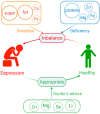Appropriate Macronutrients or Mineral Elements Are Beneficial to Improve Depression and Reduce the Risk of Depression
- PMID: 37108261
- PMCID: PMC10138658
- DOI: 10.3390/ijms24087098
Appropriate Macronutrients or Mineral Elements Are Beneficial to Improve Depression and Reduce the Risk of Depression
Abstract
Depression is a common mental disorder that seriously affects the quality of life and leads to an increasing global suicide rate. Macro, micro, and trace elements are the main components that maintain normal physiological functions of the brain. Depression is manifested in abnormal brain functions, which are considered to be tightly related to the imbalance of elements. Elements associated with depression include glucose, fatty acids, amino acids, and mineral elements such as lithium, zinc, magnesium, copper, iron, and selenium. To explore the relationship between these elements and depression, the main literature in the last decade was mainly searched and summarized on PubMed, Google Scholar, Scopus, Web of Science, and other electronic databases with the keywords "depression, sugar, fat, protein, lithium, zinc, magnesium, copper, iron, and selenium". These elements aggravate or alleviate depression by regulating a series of physiological processes, including the transmission of neural signals, inflammation, oxidative stress, neurogenesis, and synaptic plasticity, which thus affect the expression or activity of physiological components such as neurotransmitters, neurotrophic factors, receptors, cytokines, and ion-binding proteins in the body. For example, excessive fat intake can lead to depression, with possible mechanisms including inflammation, increased oxidative stress, reduced synaptic plasticity, and decreased expression of 5-Hydroxytryptamine (5-HT), Brain Derived Neurotrophic Factor (BDNF), Postsynaptic density protein 95(PSD-95), etc. Supplementing mineral elements, such as selenium, zinc, magnesium, or lithium as a psychotropic medication is mostly used as an auxiliary method to improve depression with other antidepressants. In general, appropriate nutritional elements are essential to treat depression and prevent the risk of depression.
Keywords: appropriate supplementation; depression; macronutrients; mineral elements; overdose or deficiency.
Conflict of interest statement
The authors declare no conflict of interest.
Figures


Similar articles
-
The Role of Trace Elements in COPD: Pathogenetic Mechanisms and Therapeutic Potential of Zinc, Iron, Magnesium, Selenium, Manganese, Copper, and Calcium.Nutrients. 2024 Nov 28;16(23):4118. doi: 10.3390/nu16234118. Nutrients. 2024. PMID: 39683514 Free PMC article. Review.
-
Bioelements in the treatment of burn injuries - The complex review of metabolism and supplementation (copper, selenium, zinc, iron, manganese, chromium and magnesium).J Trace Elem Med Biol. 2020 Dec;62:126616. doi: 10.1016/j.jtemb.2020.126616. Epub 2020 Jul 11. J Trace Elem Med Biol. 2020. PMID: 32739827 Review.
-
Essential elements in depression and anxiety. Part I.Pharmacol Rep. 2014 Aug;66(4):534-44. doi: 10.1016/j.pharep.2014.03.001. Epub 2014 Apr 2. Pharmacol Rep. 2014. PMID: 24948052 Review.
-
Are Essential Trace Elements Effective in Modulation of Mental Disorders? Update and Perspectives.Biol Trace Elem Res. 2022 Mar;200(3):1032-1059. doi: 10.1007/s12011-021-02733-y. Epub 2021 Apr 27. Biol Trace Elem Res. 2022. PMID: 33904124 Review.
-
Magnesium and trace elements in the elderly: intake, status and recommendations.J Nutr Health Aging. 2002;6(2):147-53. J Nutr Health Aging. 2002. PMID: 12166371 Review.
Cited by
-
Correlation Between Systemic Immune Inflammatory Index and Suicidal Attempt in Patients with First-Episode Untreated Depression and its Risk Factors.Neuropsychiatr Dis Treat. 2025 Apr 11;21:827-839. doi: 10.2147/NDT.S512964. eCollection 2025. Neuropsychiatr Dis Treat. 2025. PMID: 40235962 Free PMC article.
-
Association between methylmalonic acid and prevalence of depression in US adults: evidence from NHANES 2011-2014.Eur J Psychotraumatol. 2025 Dec;16(1):2450109. doi: 10.1080/20008066.2025.2450109. Epub 2025 Feb 13. Eur J Psychotraumatol. 2025. PMID: 39943880 Free PMC article.
-
Proteomics analysis in rats reveals convergent mechanisms between major depressive disorder and dietary zinc deficiency.Pharmacol Rep. 2025 Feb;77(1):145-157. doi: 10.1007/s43440-024-00681-7. Epub 2024 Dec 3. Pharmacol Rep. 2025. PMID: 39623245 Free PMC article.
-
Predicting peripartum depression using elastic net regression and machine learning: the role of remnant cholesterol.BMC Pregnancy Childbirth. 2025 May 8;25(1):544. doi: 10.1186/s12884-025-07656-3. BMC Pregnancy Childbirth. 2025. PMID: 40340559 Free PMC article.
-
Changes in the distribution of elements in the liver and various brain regions in suicides from southeastern Poland.Sci Rep. 2025 May 29;15(1):18946. doi: 10.1038/s41598-025-03283-2. Sci Rep. 2025. PMID: 40442250 Free PMC article.
References
-
- World Health Organization Depression. [(accessed on 1 May 2021)]. Available online: http://www.who.int/mediacentre/factsheets/fs369/en/
Publication types
MeSH terms
Substances
Grants and funding
LinkOut - more resources
Full Text Sources

